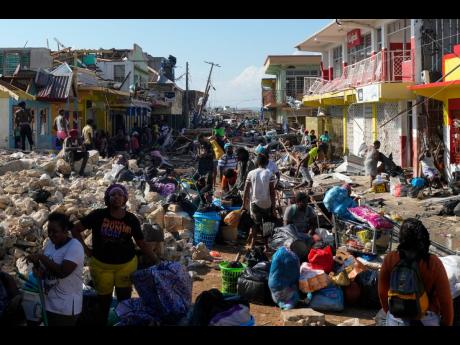By Nazima Raghubir
Three weeks after Hurricane Melissa descended on Jamaica, new details have emerged that demonstrate the impact of the Category Five hurricane on the island. In a situation report released by the Caribbean Disaster Emergency Management Agency (CDEMA) on Friday, some 90,000 households have been displaced, 191,000 buildings damaged, 182 communities and more than 600 schools affected. These numbers are likely to change in the coming weeks as assessment and relief efforts continue.

CDEMA has been coordinating assessment teams prior to the hurricane as well as much needed relief. All of this is being done in collaboration with the Jamaican government through the Office of Disaster Preparedness and Emergency Management. Earlier this week, CDEMA’s Executive Director Elizabeth Riley said while the priorities remain “getting water, food, shelter to persons displaced,” there has been work to coordinate the some more than 100 regional and international humanitarian actors who remain on the ground to ensure that all areas of relief are being addressed. “So the arrangements in country with respect to the response are settling quite a bit, it is not unusual in the immediate aftermath of events that we have a settling period where we really try to assess exactly what has happened, how many persons have been affected, what those priority needs are,” Riley explained, “so in terms of the key priorities in settling are related to a much better streamlining of the relief distribution system.
There has been direct contact with thousands of those affected and Riley said many persons are still trying to cope, “I think we have to recognize that it’s really been a shock to the population and some of the personal accounts that I have heard about the experience of going through the system really point to the need for very strong mental health and psychosocial support to the population as an ongoing arrangement”.
Additionally, CDEMA’s Executive Director pointed out that even with these realities, there is a recognizable resilience among people, “they recognize that the country will be going through a difficult time for maybe several years to come,” Riley said, “but persons are very much committed to working together and making sure that those that really need support receive that. We’ve also seen such an outpouring of amazing support from other Jamaicans who are in sections of the country that have not been affected”.
Assessment teams have been working in the island prior to the Hurricane and remain on the ground with focus on infrastructure, water, electricity, and communication. Based on CDEMA’s latest report, more than 1300 remain in shelters, 31% of the affected areas remain without electricity but 65% of mobile connection has been restored along with considerable water connections.
The full situation report could be found on https://www.cdema.org/ along with a link on how you can donate directly to relief efforts.
